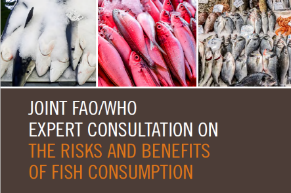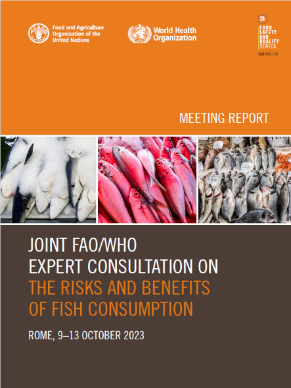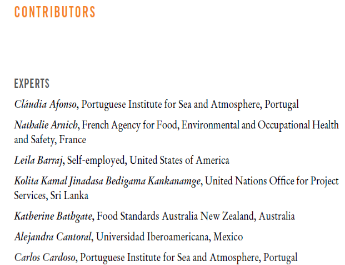Risks and Benefits of Fish Consumption
 2024-10-14 (IPMA)
2024-10-14 (IPMA)
The FAO (Food and Agriculture Organisation of the United Nations)/WHO (World Health Organization) has published the joint consultation report prepared by the FAO/WHO expert committee on “The Risks and Benefits of Fish Consumption”. This report is based on a long work of data analysis and document revision, which has begun last year. This document is the final stretch in a very thorough process and it is an update and revision of the last report on this theme, which was published more than a decade ago.
It is a public document directed to scientists, stakeholders, and all world citizens and it is entitled “Joint FAO/WHO Expert Consultation on the Risks and Benefits of Fish Consumption: Meeting report” (DOI: https://doi.org/10.4060/cd2394en; internet access/link: https://openknowledge.fao.org/items/f2d38771-fd6e-44f3-b10c-cc578aafcec5). We believe that this report must be considered an absolute international reference on this subject, providing guidelines about a healthy diet with inclusion of seafood. Indeed, this document concludes that the benefits of seafood consumption clearly exceed any risk, thus being advised the consumption of food belonging to this group, which is so important in the Portuguese diet.
Besides their effort and dedication, each expert contributed his/her own knowledge and past experience to the accomplishment of this ambitious project. In fact, FAO/WHO set up a committee of specialists in the areas of public health, nutrition, toxicology, food science, bio-statistics, and risk-benefit assessment. These experts were asked to revise all knowledge and data concerning the theme of the risks and benefits of seafood consumption encompassing all meaningful scientific studies since 2010, the year of the last official opinion and respective report by a previous joint expert committee. In 2023, the new committee of experts was gathered during a whole week from 9 to 13th October in Rome, Italy, at the main seat of FAO, but the related work and study had to be carried out and completed in the following months.
It should be mentioned that two IPMA researchers, Cláudia Afonso and Carlos Cardoso, participated as experts in this Joint FAO/WHO Expert Consultation and completely supported its conclusions, which agree with the results of their scientific studies.
Regarding this point, some scientific studies published by these two researchers regarding precisely the assessment of the risk-benefit associated to seafood consumption by the Portuguese population may be highlighted:
Cardoso, C., Bernardo, I., Bandarra, N.M., Martins, L.L., Afonso, C. 2018. Portuguese preschool children: Benefit (EPA+DHA and Se) and risk (MeHg) assessment through the consumption of selected fish species. Food and Chemical Toxicology, 115: 306-314. https://doi.org/10.1016/j.fct.2018.03.022
Afonso, C., Bernardo, I., Bandarra, N.M., Louro Martins, L., Cardoso, C. 2019. The implications of following dietary advice regarding fish consumption frequency and meal size for the benefit (EPA+DHA and Se) versus risk (MeHg) assessment. International Journal of Food Sciences and Nutrition, 70:5, 623-637. https://doi.org/10.1080/09637486.2018.1551334
Carvalho, C., Correia, D., Severo, M., Afonso, C., Bandarra, N., Gonçalves, S., Torres, D. 2021. Quantitative risk-benefit assessment of Portuguese fish and other seafood species consumption scenarios. British Journal of Nutrition, 128(10), 1997-2010. https://doi.org/10.1017/S0007114521004773
Imagens associadas



